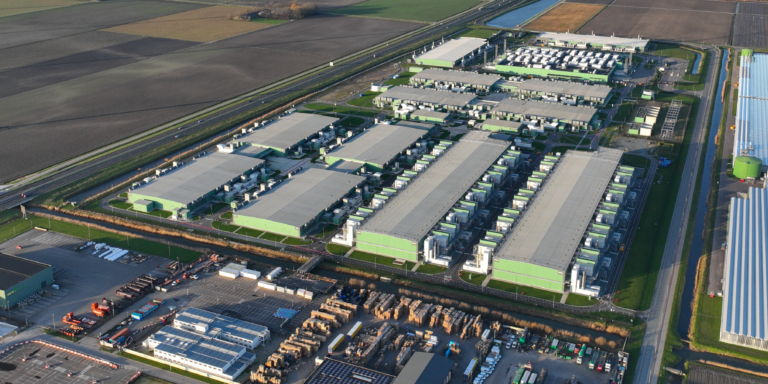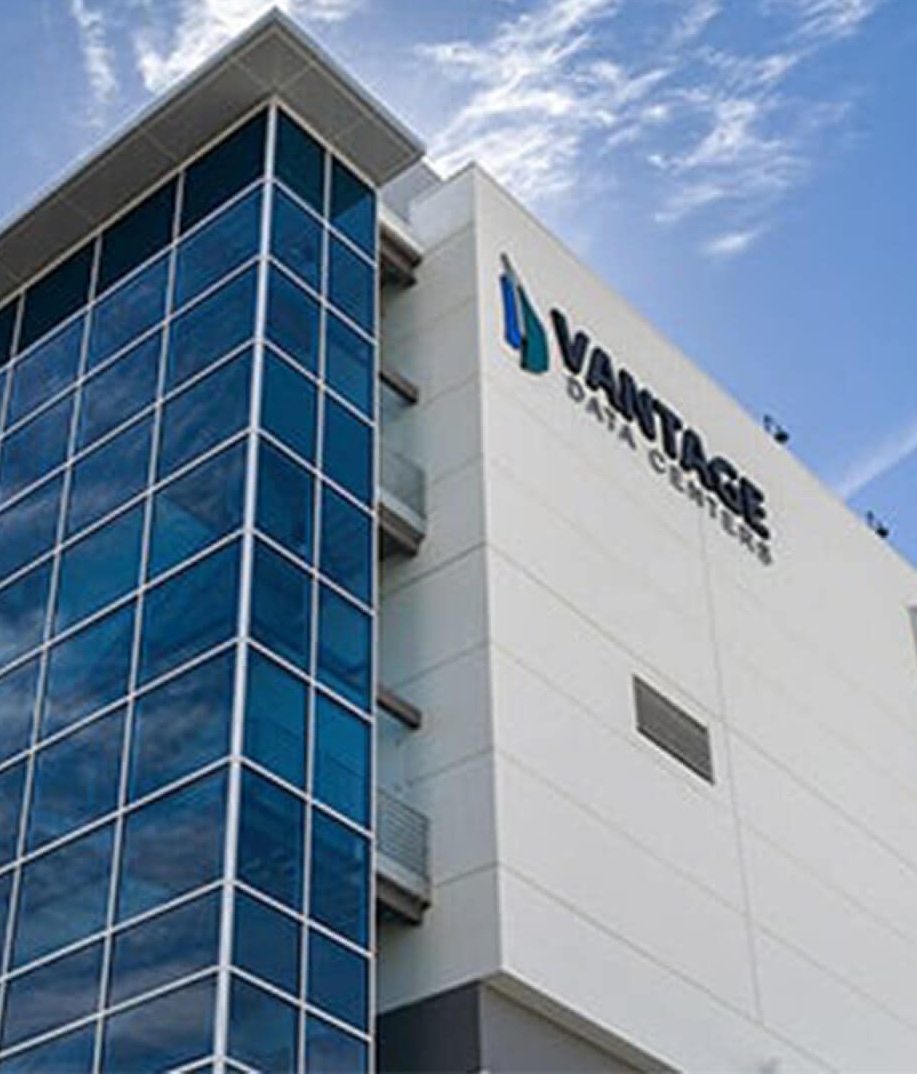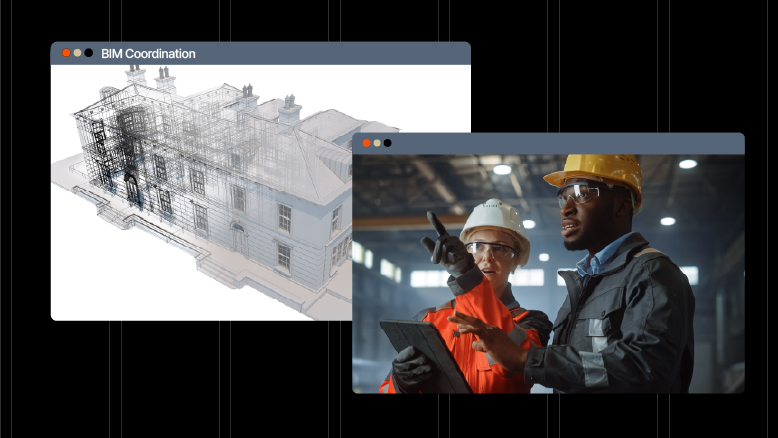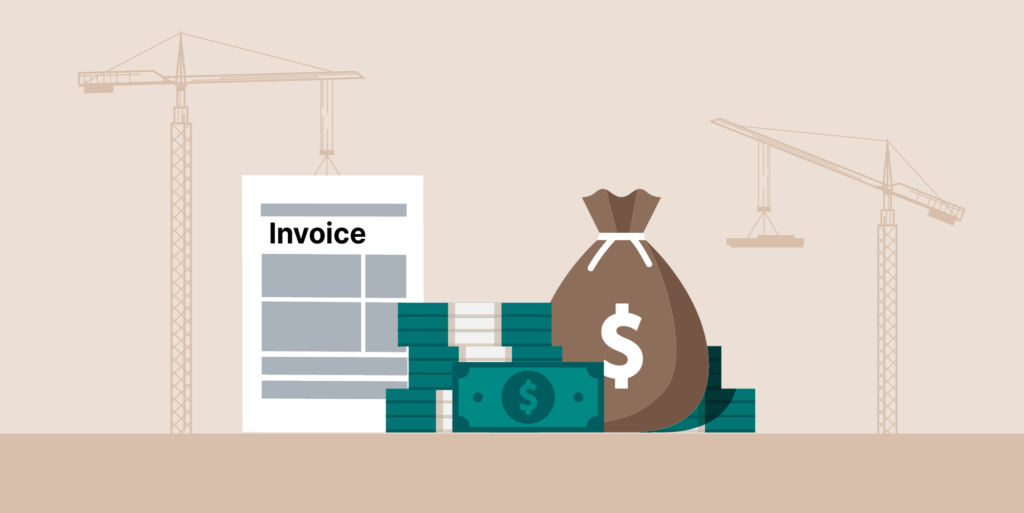— 10 min read
Data Center Construction: Building the Cloud
Last Updated Aug 7, 2024
Last Updated Aug 7, 2024

As the demand for digital data increases, so does the demand for the physical structures and equipment needed to store and process data. Data centers are facilities that house computer systems that store, process and direct data used in every part of our digital lives.
Data centers have a lot of specific needs, and meeting these needs starts with construction, either by building new data centers or expanding existing ones. This article explores the construction of data centers, common challenges, best practices and the phases of the process.
Table of contents
The Basics of Data Center Construction
Data centers are usually exclusively devoted to housing the hardware needed for storing and processing digital information. The demand for data center capacity has been steadily growing for years and is expected to grow around 10% every year until 2030.
The aesthetic considerations for the interior of a data center are usually minimal — and the exterior is usually intentionally nondescript to avoid drawing attention to the building. This makes the process of building the facility relatively predictable, as each center must have:
- IT hardware, including servers, cables, routers and modems
- Storage for hardware, specifically racks and cabinets. Racks are open metal frames that hold servers and cabinets are enclosed, secured frames that hold servers.
- Industrial systems and equipment, including mechanical, electrical, and plumbing (MEP), cooling, fire suppression and backup generators
The real challenge — and perhaps the most important part of data center construction — is finding suitable sites and ensuring they can meet the facility’s specific needs, particularly in regard to space and energy.
Some data centers are built in reconstructed factories or warehouses. New data centers are often built in the areas around large cities, where they can find enough open space but can connect to an expansive, established electrical grid.
Many owners and general contractors (GCs) have extensive due diligence checklists that they use to assess a potential site and determine whether it meets a data center’s minimum requirements. Here are a few key considerations during site evaluation and design.
"We have real data with integrity to base our decisions on."
Learn how Vantage Data Centers created a single source of truth to improve data analytics, financial performance and communication across five continents.

Energy
Servers require extraordinary amounts of electrical power and must be kept at specific temperatures at all times. A site must have access to a power grid that can keep the servers running and the cooling systems working around the clock.
Size
Data centers are huge, and, with the increased demand, are only getting larger. New and reconstructed sites must be able to meet the demands for data center capacity, which is usually measured in three ways:
- Racks: the number of racks conveys the amount of space available for servers
- Square footage: Many new facilities are now larger than 250,000 square feet
- Power capacity in megawatts: Many new facilities have a power capacity between 80 to several hundred megawatts
Reliability
Like the internet itself, data centers need to be on at all times, with no exceptions. Beyond having enough power, most data centers have extensive backup systems that can keep servers and cooling systems functioning, even when local power goes out. This often includes power generators or uninterruptible power supplies, which provide automated backup when the main power source goes down.
The Data Center Construction Process
The construction of a data center follows the typical phases of construction, but has a few unique processes and considerations.
Planning
Much of the planning phase focuses on thoroughly analyzing potential sites to determine that they can meet the minimum requirements of hosting a data center.
Many GCs and owners have a due diligence checklist of minimum requirements needed for a site. These lists vary based on the owner’s needs.
| Requirement | Considerations |
|---|---|
| Layout | Is the space big enough? Is there adequate parking or space to create it? |
| Access | Are there adequate ways to enter and exit the facility? Can the equipment needed for construction and the building’s operation be delivered? |
| Zoning | What are the zoning and permitting requirements? |
| Structure | Are there existing structures on the site? Can they be repurposed? |
| Expansion | Is there potential to expand on the site in the future if the need presents itself? |
| Environmental conditions | What are common storm patterns? Where is the site located on flood maps? Is the ground soil contaminated? |
| Power capacity | Is the facility able to effectively connect to the local provider’s power source? Is the price offered by the provider reasonable? |
| Fiber connectivity | Does the building have access to the digital infrastructure in the area? |
| Neighborhood dynamics | Are there local limitations on sound, potential security threats or dynamics within the surrounding area that might impact customer perception? |
| Access to utilities | Is there access to other utilities, including gas, sewage and especially water (which can play an important role in cooling systems)? |
| Taxes | Are there tax incentives available for building or using data centers? |
| Status of the property | Are there liens, covenants or restrictions on the property? |
Once a site meets the minimum requirements for a data center, the design process tends to happen quickly. Designs and plans for data centers are often heavily replicated from site to site, accommodating any unique characteristics of the surrounding area.
Many owners have designs they can deploy in different scenarios, such as a facility they plan to rent, a repurposed warehouse, or building on a site with the potential to expand in the future.
Preconstruction
Data center owners often open bids to GCs after their site has been vetted and secured and designs have been made. Owners usually open the bidding to only a very short list of contractors – often between three and five — who they know are specialized, experienced, and can be trusted to get the job done quickly and at a reasonable price. Once selected, GCs often consult heavily with the design team to revise the drawings based on constructability, value engineering and available materials.
Similarly, owners and GCs usually have a short list of trusted vendors and manufacturers, who can provide reliable materials and equipment and are able to give accurate estimates for procurement times. Given the specialized nature of the equipment, delays in procurement are common, have increased in the last few years and are a very real threat to the project finishing on time.
Data centers are often built with quite a few redundancies because of the building’s extreme, around-the-clock energy needs. The facility should have secure access to electricity and water, as well as plans in case local utilities go down, which might include backup systems such as heavy-duty MEP generators, alternative forms of energy, and extra cooling systems.
Construction
GCs and the design team are often changing, updating and revising design drawings throughout the construction process, based on how the build is going, the availability of equipment, and material procurement.
GCs are constantly assessing the cost impact and the schedule impact of alternative construction methods or materials, sending requests for information (RFIs), and submitting changes to the drawings and for new materials. GCs are always looking for ways to keep the project moving forward and avoid any delays, as a completed data center almost immediately begins to earn an immense amount of money for the owners. Delays can sometimes result in a GC having to pay liquidated damages.
Post-construction
Because of the specialized nature of data centers, commissioning reports are an extremely important element of closeout documentation. During commissioning, the newly installed system is tested to ensure its performance is at or above acceptable levels.
In data centers, commissioning reports are prepared throughout construction and into post-construction to verify servers, MEP systems, cooling systems, and generators are installed correctly and functioning properly. Similarly, the closeout documents will need to include operation and maintenance manuals for each of the systems.
Stay updated on what’s happening in construction.
Subscribe to Blueprint, Procore’s free construction newsletter, to get content from industry experts delivered straight to your inbox.

Roles and Responsibilities in Data Center Construction
Data center construction is often a repetitive process, but the people who work on these projects are usually very specialized.
| Owners | Data centers are generally owned and operated by one of two groups: Big companies, such as banks, telecommunication providers or cloud service providers using the facilities for their own purposes. Colocation companies, which lease out data centers to tenants or a collection of tenants. In this agreement, the colocation company usually provides the power, the network capacity and the cooling systems, while the tenant provides their own IT equipment. |
| General Contractor | Data center construction is a relatively exclusive specialization for GCs. Most owners only open bidding to a very short list of trusted, experienced GCs for each project. GCs must also have the ability to cover any potential liquidated damages on a project. Having access to such a large amount of money further limits the field of candidates.While most data center projects are design builds, GCs should be prepared to contribute to the design development, and finalize drawings based on constructability and the availability of materials and equipment. |
| Local governments and building authorities | Local governments or building authorities are often involved in vetting the site for a data center because of the extraordinary need for energy. Municipalities will ensure the site has the capacity to supply the required energy without leaving the surrounding area without power. |
Common Challenges in Data Center Construction
Below are some common issues faced during data center construction.
Numerous Stakeholders
Compared to other types of commercial construction, data centers have many more stakeholders. Many owners are multinational companies who need to coordinate their efforts across the globe. Locally, data centers rely on numerous utility companies and local municipalities. In many cases, data centers will rent out racks in their facilities to tech companies that have specific needs or preferences for the building’s design.
High Cost of Delays
Data centers make an immense amount of money from the second they open. GCs can be on the hook for extraordinarily high liquidated damages if they miss deadlines or the project is delayed. GCs are constantly looking for ways to speed up the build or keep it on track, possibly by adjusting the design, submitting RFIs, or putting in change orders when necessary.
Varying Standards & Regulations
Most owners are multinational corporations, but their data centers are built in places with their local regulations, processes, material procurement issues, and expectations. Data center owners often create their own standards for construction to ensure their facilities are completed with the utmost levels of quality and safety.
Best Practices in Data Center Construction
There are a few things that almost always improve the data center construction process.
Create digital systems for document and project management.
Owners and their preferred GCs are often doing work that spans the globe, so they have come to rely on systems that standardize and streamline the ways they develop, store and share plans, designs, and schedules. These systems, like Procore, have sped up the construction process by organizing and centralizing progress reports, submittals, and invoicing.
Plan for redundancies.
Data centers make the internet work, so they can’t go offline – ever. Data centers should have elaborate and thorough backup systems that ensure – even in emergency situations – power will stay on, rooms will stay cool, and servers will keep working.
The Sustainability of Data Centers
Most data centers’ massive demands for energy can come at a great cost to owners paying the electric bill, local energy providers working to meet demand, and to the environment. Data center construction will likely continue to be a fairly predictable process, but the ways data centers use and store energy is likely to change, as owners and designers are increasingly looking for energy options that are more efficient, affordable and sustainable.
Was this article helpful?
Thank you for your submission.
100%
0%
You voted that this article was . Was this a mistake? If so, change your vote here.
Scroll less, learn more about construction.
Subscribe to The Blueprint, Procore’s construction newsletter, to get content from industry experts delivered straight to your inbox.
By clicking this button, you agree to our Privacy Notice and Terms of Service.
Categories:
Tags:
Written by
Hunter Minary
Hunter Minary is a Principal Strategic Product Consultant at Procore. He has more than 10 years of construction industry experience, with previous roles as a Senior Project Engineer and Assistant Operational Technology Manager at the Beck Group. Hunter holds a Bachelor of Science in Construction Management from Colorado State University and is based in Dallas, Texas.
View profileJames Hamilton
70 articles
James Hamilton is a writer based in Brooklyn, New York with experience in television, documentaries, journalism, comedy, and podcasts. His work has been featured on VICE TV and on The Moth. James was a writer and narrator for the show, VICE News Tonight, where he won an Emmy Award and was nominated for a Peabody Award.
View profileExplore more helpful resources

How to Understand and Use Architect’s Supplemental Instructions
Architect’s supplemental instructions, also known as ASI, offer a means of making small changes to the construction contract after it’s signed. The ASI is a document issued by the architect...
Improving Project Monitoring with Construction Quantity Tracking
Once a construction project is underway, builders need to closely monitor the project’s progress and make sure it’s staying on schedule and within budget. Quantity tracking helps construction leaders manage...

Streamlining Construction Projects with Effective BIM Coordination
The old saying goes: if you fail to plan, you plan to fail. Construction professionals know this better than nearly anyone. To take a project from a vision in an owner’s...

Construction Invoice Factoring: A Quick Guide
Construction companies need to maintain consistent cash flow. Projects can take years to complete, and delays and unforeseen events may keep expenses mounting. Adding to this load are typically high upfront...